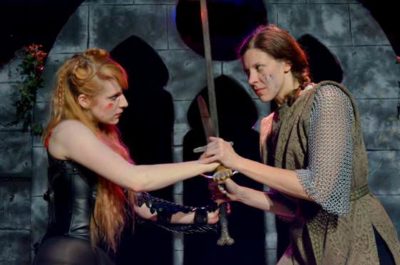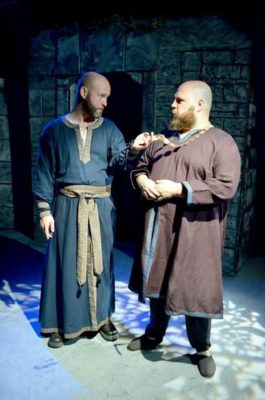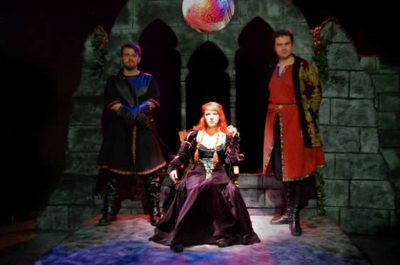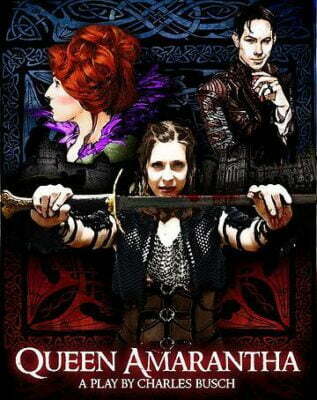Queen Amarantha
Directed by Tiffany Keane
Produced by Otherworld Theatre, Chicago
Cape and Sword Entertainment Returns to Stage
When Charles Busch’s Queen Amarantha debuted in 1997, it was a drag-show with its author in the title role. According to reviews at the time, the campy melodrama seems to have clashed with the show’s exploration of gender roles in an early modern fantasy world. But in 2015, with Game of Thrones and Adventure Time dominating television, fantasy-themed video games having become ubiquitous, and Peter Jackson’s Lord of the Rings films having made nerdom mainstream for twelve years, Otherworld Theatre company is betting that audiences will respond positively to a straightforward political melodrama, with an actual woman playing Queen Amarantha, and the focus on the story of her rise, fall, and return to power. It’s a big risk for the new company, which specializes in science-fiction and fantasy, but one that I think will pay off.

Our setting, the island-nation of Annwyn, lies somewhere in the north Atlantic, apparently shortly after the Columbian expeditions and Reformation. The old warrior king has just died, and been succeeded by his daughter, Amarantha (Moira Begale). The cruel tyrant of a corrupt court, the old king hid away his crown so his daughter could not have it, and with that parting display of contempt, Amarantha’s reign is off to a rocky start. She makes powerful enemies by vowing to investigate the embezzlement of a large portion of the treasury, and insists on asking the advice of her maid, Edra (Grace Gimpel). But despite her condescension to the common people, Amarantha does not truly like or trust them, either. Often, while she claims to be out doing acts of good for individuals, she is disguised as a man, a form she feels more comfortable in. It is in that guise that she meets Adrian (Brendan Stallings), a handsome bisexual actor who prefers her masculine side. She also reunites with her childhood friend, Thalia (Mary-Kate Arnold), whose entire family was put to death by Amarantha’s father.

The queen is soon betrayed, as Thalia plots with her advisors to depose her, and Adrian is revealed as an assassin. Though Amarantha and Adrian preposterously reconcile, Thalia frames her for corruption with the aid of the wicked Chancellor Agar (Elliott Sowards) and Earl of Moreland (David Servillo). Forced to flee or face an enraged mob, Amarantha cedes the throne to her weak and venal cousin, Roderigo (Dylan Schaefer), effectively allowing Thalia to take over Annwyn. The former victim of persecution quickly becomes a tyrant, but Amarantha has a whole bunch of issues surrounding her self-loathing, confusion over her gender, and difficulty with trust to resolve before she can hope to become a competent ruler.
The play is described in Busch’s website as a melodrama, and that it is, thanks to the omnipresent music design by Rachel Geistfeld. Certainly the type of sound we’ve been trained to think of as “epic”—and not in a Brechtian sense—is a major contributor to this story’s brooding, violent style. The main character is also loosely inspired by Queen Christina Vasa of Sweden, whose gender and sexuality have always been disputed, and was forced to resign the throne under suspicion of financial impropriety and abuse of the legal system to execute whistleblowers. In that regard, Queen Amarantha can be regarded as a “what-if.” Begale depicts her as a fierce warrior, but confused in her feelings, and ignorant of how she affects others. Schaefer, who physically resembles Nero, plays Roderigo with a simper and a whiff of sleaze that makes it odd for Amarantha to care for him as much as she does. Stallings is a charmer, and the three villains are delightfully deranged, particularly Arnold’s intense performance as the half-mad Thalia.

The length of this show and complexity of its plot make it a major commitment for the audience as well. Indeed, one of the best aspects of the show is the fight choreography by Kai Young, which includes a duel between Justin Verstraete, as Thalia’s henchman, and three other actors. Queen Amarantha’s gender politics are a lot more straightforward without the drag aspect, which should make the show more accessible and relevant to a larger number of people. Though the script contains some absurdities and heavy-handed characterizations (which sort of comes with the territory), Tiffany Keane’s direction keeps up the energy of this story to its thrilling conclusion. Proudly melodramatic, this production is well-crafted and delivers precisely the fun it advertises.
Recommended
Jacob Davis
[email protected]
Reviewed June 12, 2015
For more information, see Queen Amarantha’s page on Theatre in Chicago.
Playing at City Lit Theatre, 1020 W Bryn Mawr, Chicago. Ticets are $20

